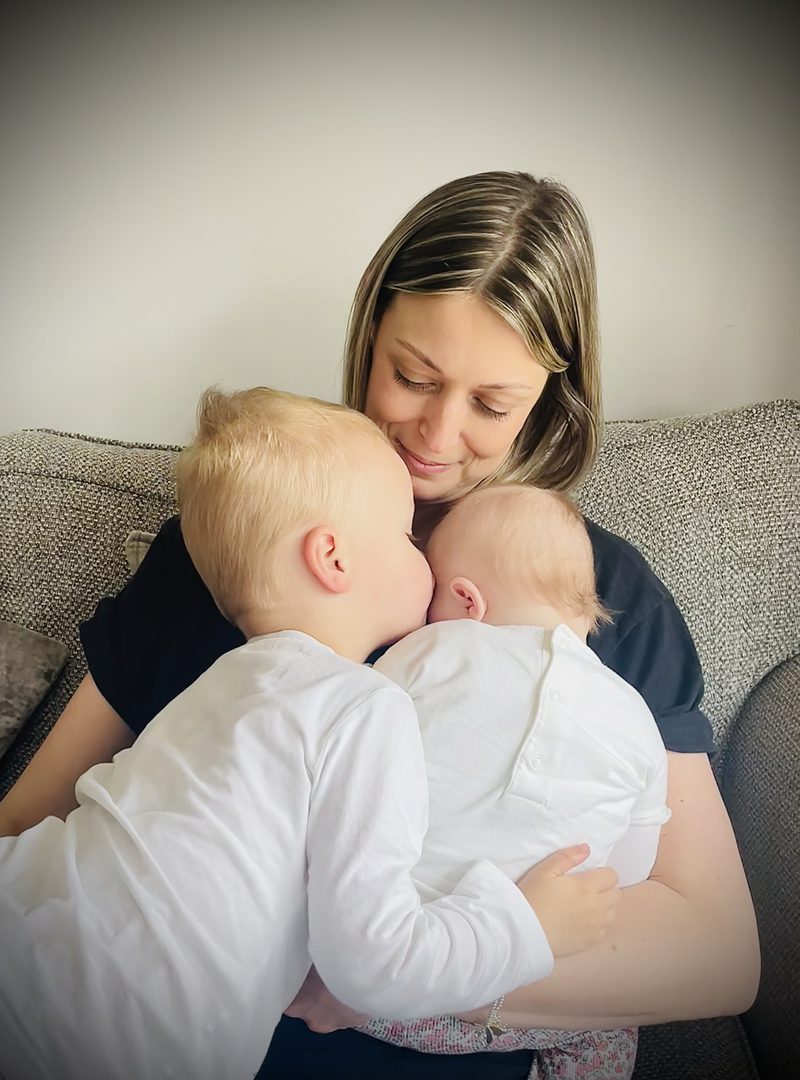Embryo Selection gives Bristol couple their perfect pair
A couple from Bristol who were struggling to have a baby now have a three-year old son and a five-month-old daughter who probably would not have been born were it not for preimplantation genetic testing (PGT).
Under the care of BCRM Michelle and Paul were able to establish that the possible cause of their problems was a very rare chromosomal disorder.
It was selection of healthy embryos in the clinic’s laboratory that finally gave the pair the family of their dreams.
The couple, who live in Hanham, started trying for a family in 2016 when Michelle was 29, and she became pregnant but miscarried at six weeks.
After a year with no new pregnancies, they consulted their GP and were dismayed to learn they would not be eligible for NHS treatment until two years had passed since the date of the previous pregnancy. They decided to pay for private treatment, but investigations in January 2018 offered no explanation for their problems: nothing ‘fixable’ was identified. They started on IVF and the first cycle yielded 10 very good eggs, but all had perished by day three. Michelle said: “I felt very low and started fearing I would never be able to have a baby, even with help. “Our experience at that first private clinic wasn’t great. We saw a different doctor every time we went and had to travel two hours for the bigger procedures. “A further cycle of IVF yielded nine eggs from which nine blastocysts were created, which all survived to day five and were graded highly. “When no baby resulted from our first transfer, I fell apart. “More heartbreak followed our second transfer: we thought I was pregnant, but it turned out to be a bio-chemical pregnancy and the six-week scan showed there was no baby.
“We started looking at other clinics.”
At one of the regular public open evenings offered by BCRM, a free mini consultation with one of their fertility experts favourably impressed Michelle and Paul who decided to transfer there for future IVF treatment.
“What swung it was the nurturing way we were addressed throughout,” said Michelle.
“Everyone was just lovely with us – consultants, nurses, receptionists – and we never had a thoughtless “Have a nice day” directed at us. That can be so inappropriate when you’re facing fertility issues.
“We appreciated the free parking too. That might sound silly, but it’s one less thing to worry about.”
Arrangements were made to transfer the couple’s remaining frozen embryos from the original clinic to BCRM and in April 2019 they embarked on their next transfer with their new clinic.
The first embryo transfer resulted in a positive pregnancy test and the six-week scan revealed a heartbeat.
However, a lack of normal pregnancy-related symptoms led the pair to seek another scan at nine weeks, and tragically this one revealed that Michelle had suffered what is referred to as a ‘missed miscarriage.’
They agreed the foetus should be examined to try and establish what the issue was, and when the results were explained to them by BCRM’s clinical lead, Valentine Akande , they learned the problem was a very rare chromosomal disorder.
Michelle said: “At this point we had six remaining frozen embryos. Valentine said the chances were good that at least one of them would be free of the chromosomal disorder, so we decided to invest in preimplantation genetic testing PGT
“He was right: precisely one embryo tested clear. “By now it was late 2020: a year had passed, and we finally qualified for treatment on the NHS.
“This confronted us with a choice: we could either have that final embryo transferred, or we could go in for a whole new round of IVF which would enable us to have more embryos created and frozen. “We decided to go for the whole round but then we faced a six-month delay because of Covid.
“Later that year another round yielded 10 eggs, which resulted in six blastocysts. We again paid to have these tested, and again just one of the embryos was free of the chromosomal disorder.
“We continued under the NHS within BCRM and had the most recent embryo transferred but sadly no pregnancy resulted.
“So then we paid for the original embryo to be transferred with BCRM and, finally, success!”
Michelle and Paul celebrated the arrival of baby Seth at the RUH in Bath in October 2021.
Michelle said: “We hadn’t intended to go in for a second baby, but by the time he had his first birthday we knew we really wanted a sibling for Seth, although we’d have to start from scratch and take out a bank loan to do it. “We decided that if it didn’t work first time we would leave it, but we wanted to have just one more try.
“So in February 2023 we started again: this would be my fourth egg retrieval, and it yielded eight eggs.
“Five days later there were five embryos suitable for testing, and then we faced a three-week wait for the test result but the results were promising: this time three of the embryos tested suitable for transfer. “In May 2023 the first of the three was transferred, and in January 2024 baby Nancy was born.
“We are so thankful for the advances in reproductive medicine and with preimplantation genetic testing that have made it possible for couples like us to have a baby when our attempts at natural conception were proving so heart-breaking.
“It’s an expensive process, but the results are priceless really!
“We attended the celebration party BCRM threw last month to mark the 40th anniversary of the first ‘made in Bristol’ IVF baby and it was amazing to meet so many other families who owe their existence to the wonderful team who work at that clinic. We are forever grateful to them.”
Take a look at our PGT blog: PGT basics
